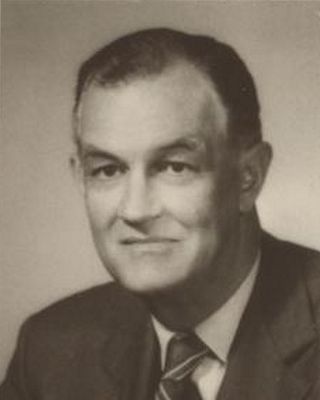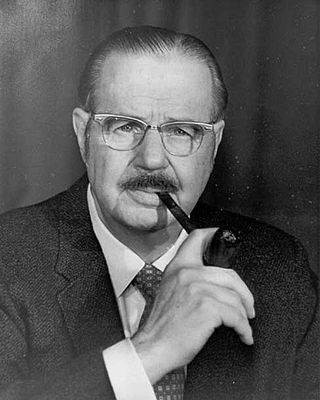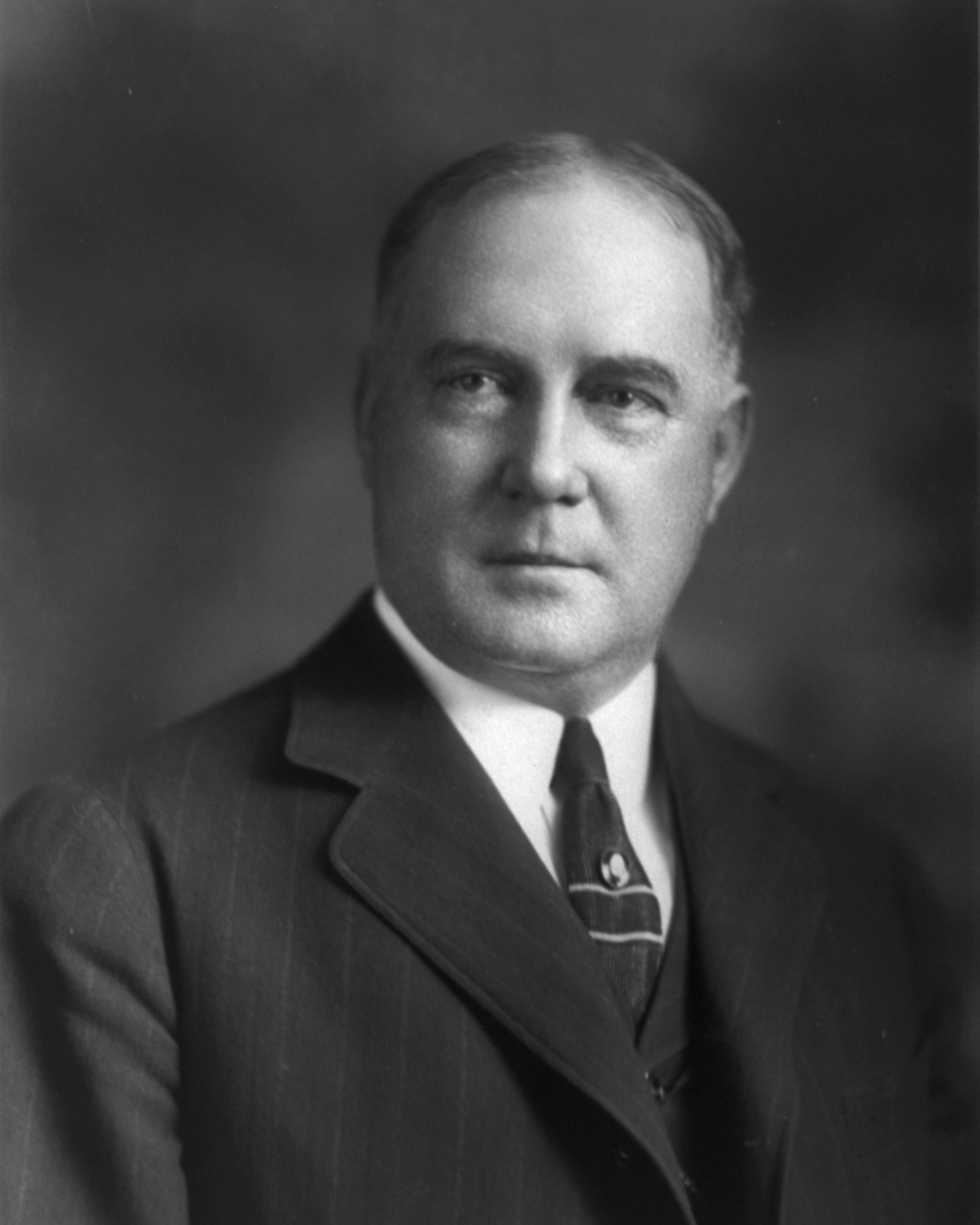Related Research Articles

The 1964 United States presidential election was the 45th quadrennial presidential election. It was held on Tuesday, November 3, 1964. Incumbent Democratic President Lyndon B. Johnson defeated Senator Barry Goldwater, the Republican nominee, in a landslide. Johnson was the fourth and most recent vice-president to ascend to the presidency following the death of his predecessor and to win a term in his own right. With 61.1% of the popular vote, Lyndon B. Johnson won the largest share of the popular vote for the Democratic Party in history, and the highest for any candidate since the advent of widespread popular elections in the 1820s.

Mills Edwin Godwin Jr. was an American politician who was the 60th and 62nd governor of Virginia for two non-consecutive terms, from 1966 to 1970 and from 1974 to 1978.

Harry Flood Byrd Jr. was an American orchardist, newspaper publisher and politician. He served in the Senate of Virginia and then represented Virginia in the United States Senate, succeeding his father, Harry F. Byrd Sr. His public service spanned thirty-six years, while he was a publisher of several Virginia newspapers. After the decline of the Byrd Organization due to its massive resistance to racial integration of public schools, he abandoned the Democratic Party in 1970, citing concern about its leftward tilt. He rehabilitated his political career, becoming the first independent in the history of the U.S. Senate to be elected by a majority of the popular vote.

Hugh Doggett Scott Jr. was an American politician. A member of the Republican Party, he represented Pennsylvania in the U.S. House of Representatives from 1941 to 1945 and from 1947 to 1959 and in the U.S. Senate, from 1959 to 1977. He served as Senate Minority Leader from 1969 to 1977.

Andrew Jackson Montague was a Virginia lawyer and American politician. He served as the 44th governor of Virginia, from 1902 to 1906, and a Congressman from 1912 until his death in 1937. A Democrat, Montague was the first Virginia governor since the American Civil War not to have served in the Confederate military. Initially a Progressive, Governor Montague expanded the state capitol building, supported public education and the Good Roads Movement and opposed the Martin Organization. However, later as U.S. Congressman, he became a Conservative Democrat and supporter of the Byrd Organization.
Southern Democrats are affiliates of the U.S. Democratic Party who reside in the Southern United States.

The 1970 United States Senate elections was an election for the United States Senate. It took place on November 3, with the 33 seats of Class 1 contested in regular elections. Special elections were also held to fill vacancies. These races occurred in the middle of Richard Nixon's first term as president. The Democrats lost a net of three seats, while the Republicans and the Conservative Party of New York picked up one net seat each, and former Democrat Harry F. Byrd Jr. was re-elected as an independent.

The 1964 United States Senate elections were held on November 3. The 33 seats of Class 1 were contested in regular elections. Special elections were also held to fill vacancies. They coincided with the election of President Lyndon B. Johnson by an overwhelming majority, to a full term. His Democratic Party picked up a net two seats from the Republicans. As of 2023, this was the last time either party has had a two-thirds majority in the Senate, which would have hypothetically allowed the Senate Democrats to override a veto, propose constitutional amendments, or convict and expel certain officials without any votes from Senate Republicans. In practice, however, internal divisions effectively prevented the Democrats from doing so. The Senate election cycle coincided with Democratic gains in the House in the same year.

Abner Linwood Holton Jr. was an American politician and attorney. He served as the 61st governor of Virginia, from 1970 to 1974, and was the first elected Republican governor of Virginia of the 20th century. He was known for supporting civil rights, integration, and public investment.

The Readjuster Party was a bi-racial state-level political party formed in Virginia across party lines in the late 1870s during the turbulent period following the Reconstruction era that sought to reduce outstanding debt owed by the state. Readjusters aspired "to break the power of wealth and established privilege" among the planter elite of white men in the state and to promote public education. The party's program attracted support among both white people and African-Americans.
The Conservative Party in the United States refers to various state parties that have no connection with one another and that support conservatism in the United States.
The tertium quids were various factions of the Jeffersonian Republican Party in the United States from 1804 to 1812.
In American politics, a conservative Democrat is a member of the Democratic Party with more conservative views than most Democrats. Traditionally, conservative Democrats have been elected to office from the Southern states, rural areas, the Rust Belt, and the Midwest. In 2019, the Pew Research Center found that 14% of Democratic and Democratic-leaning registered voters identify as conservative or very conservative, 38% identify as moderate, and 47% identify as liberal or very liberal.

The Byrd machine, or Byrd organization, was a political machine of the Democratic Party led by former Governor and U.S. Senator Harry F. Byrd (1887–1966) that dominated Virginia politics for much of the 20th century. From the 1890s until the late 1960s, the Byrd organization effectively controlled the politics of the state through a network of courthouse cliques of local constitutional officers in most of the state's counties.

Henry Horatio Wells, a Michigan lawyer and Union Army officer in the American Civil War, succeeded Francis Harrison Pierpont as the appointed provisional governor of Virginia from 1868 to 1869 during Reconstruction. A Radical Republican labeled a carpetbagger, Wells was defeated for election in 1869 by Gilbert C. Walker, who also became his appointed successor. Wells then served as U.S. Attorney for Virginia and later for the District of Columbia.

Charles William Sandman Jr. was an American Republican Party politician who represented Cape May County in the New Jersey Senate from 1954 to 1966 and represented southern New Jersey in the United States House of Representatives from 1965 to 1975. He ran for the Republican nomination for Governor of New Jersey three times, losing to Wayne Dumont in 1965 and William T. Cahill in 1969, but finally receiving the nomination by defeating incumbent Governor Cahill in 1973. He lost the 1973 general election to Brendan Byrne in a historical landslide.

The politics of Virginia have followed major historical events and demographic changes in the commonwealth. In the 21st century, the northern region has become more liberal in attitudes and voting, constituting a reliable voting bloc for Democrats and joining with population centers in the Richmond Metropolitan and Hampton Roads areas to dominate the state. Political orientation varies by region, with the larger cities and suburban areas generally voting Democratic and the rural areas voting Republican. The southern, rural regions have remained rural and conservative. Until 2021 when the GOP swept all statewide offices, Virginia was shifting more Democratic and now is considered a swing state again by most pundits.
Andrew Pickens Miller was an American attorney, politician and member of the Democratic Party who served as the Attorney General of Virginia from 1970 to 1977.

Elections in Virginia are authorized under Article I of the Virginia State Constitution, sections 5–6, and Article V which establishes elections for the state level officers, cabinet, and legislature. Article VII section 4 establishes the election of county-level officers.

From March 14 to June 11, 1944, voters of the Republican Party selected delegates to the 1944 Republican National Convention for the purpose of selecting their nominee for president in the 1944 election at the 1944 Republican National Convention held from June 26 to June 28, 1944, in Chicago, Illinois.